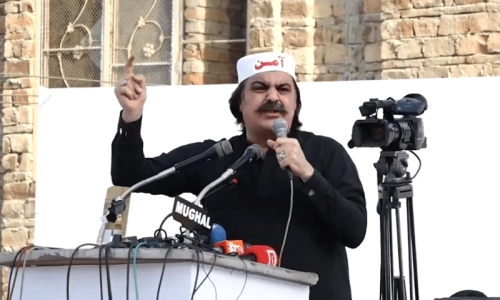KARACHI: The Sindh government said on Sunday that it had done its home work to face any possible backlash from the militants and stop free flow of internally displaced people or militants in their guise from the tribal badlands after the Zarb-i-Azb military operation was launched in North Waziristan.
“We were already on alert for terrorist attacks after the carnage on Karachi airport, but now after the launching of the operation we are extra alert and vigilant,” said Sharfuddin Memon, adviser to the chief minister on home affairs, while speaking to Dawn.
He said all sensitive installations had been doubly protected and the intelligence network had been further consolidated to check any possible violent reaction against the military operation.
Officials said they were going to focus on the endlessly mushrooming squatter settlements in the sprawling metropolis which posed a clear threat.
“We are focusing on such localities to document who resides there as an instrument to ensure improved security in future,” said Mr Memon.
Provincial Information Minister Sharjeel Memon said a red alert had been notified in the province as soon as the operation had formally been launched.
Speaking to Dawn, he said all entry and exit points of Sindh – Karachi in particular – would be checked, which would include buses and trains coming south from the upcountry.
He said a meeting was going to be summoned by the chief minister to devise a comprehensive action plan vis-a-vis the situation.
Meanwhile, the (Karachi) city police chief has sought deployment of around 5,000 policemen from other districts of Sindh to meet any eventuality.
“Though police are not trained to fight terrorism, yet we have to face it with the fullest of our potential,” said Additional Inspector General of police, Karachi, Ghulam Qadir Thebo.
He said there was a strong likelihood that the militants might target sensitive installations, including those of police, and plan attacks on political personalities who were ‘outspoken’ against terrorists.
Mr Thebo said a special force of 40 policemen each had been set up in three zones of Karachi to deal with any situation. Besides, he said, a request had been made to the Sindh IGP for deployment of 5,000 policemen in the city from other districts.
Furthermore, checking at three entry points of Karachi has been increased to prevent possible influx of militants.
“It is the general red alert as we have not received any specific threat,” said Mr Thebo.
IDPs ON SINDH BORDER: Unlike what it did five years ago when a military operation had been planned to cleanse the scenic Swat valley of Taliban, the provincial government has – as it claims – a plan to check, investigate and document every single person from tribal badlands who enter the boundaries of Sindh as an internally displaced person (IDP), senior officials said.
“We have got our preparedness right. Actually, we completed our home work a few months ago since the possibility of an operation began to become a reality,” Dr Sikander Mandhro, provincial Minister for Parliamentary Affairs, told Dawn.
He said matching arrangements had been planned to control the migration juggernaut, which would start right on the borders of North Waziristan.
“The federal government has told us about its arrangements to register each and every individual who intends to migrate from their native place in the northwest. The IDPs would be first placed in the camps in the Khyber Pakhtunkhawa province,” said Mr Mandhro. But those who wanted to head for Sindh or any other province would be allowed after documenting all details about every individual or an entire family, he added.
Similar arrangements are being made in the districts of Sindh bordering Punjab and Balochistan from where IDPs could enter the province.
“We have got the office of the National Database and Registration Authority and the United Nations organisations concerned in our loop to register and fingerprint everyone from the Federally Administered Tribal Areas who want to enter Sindh. We’ll not spare anyone as it could give a shelter to the militants in the guise of IDPs,” he said.
Published in Dawn, June 16th, 2014














































